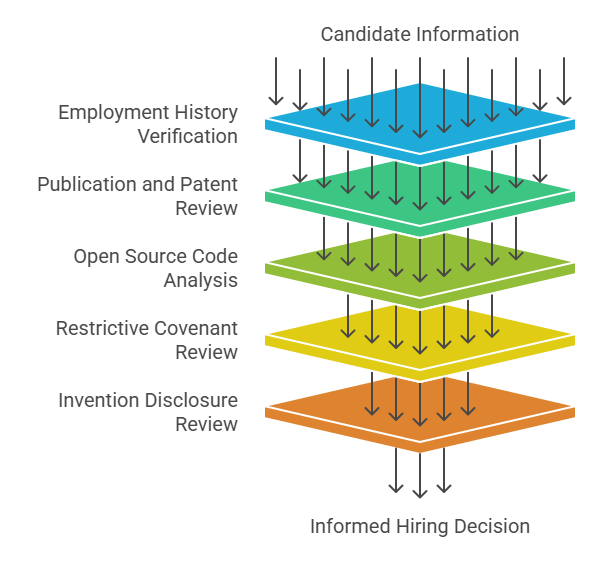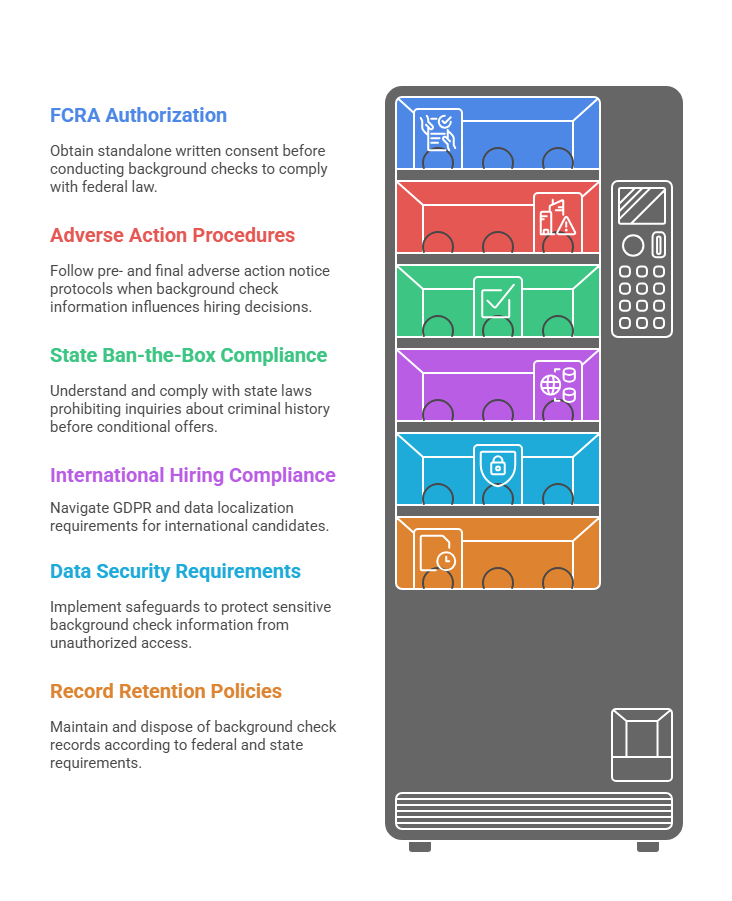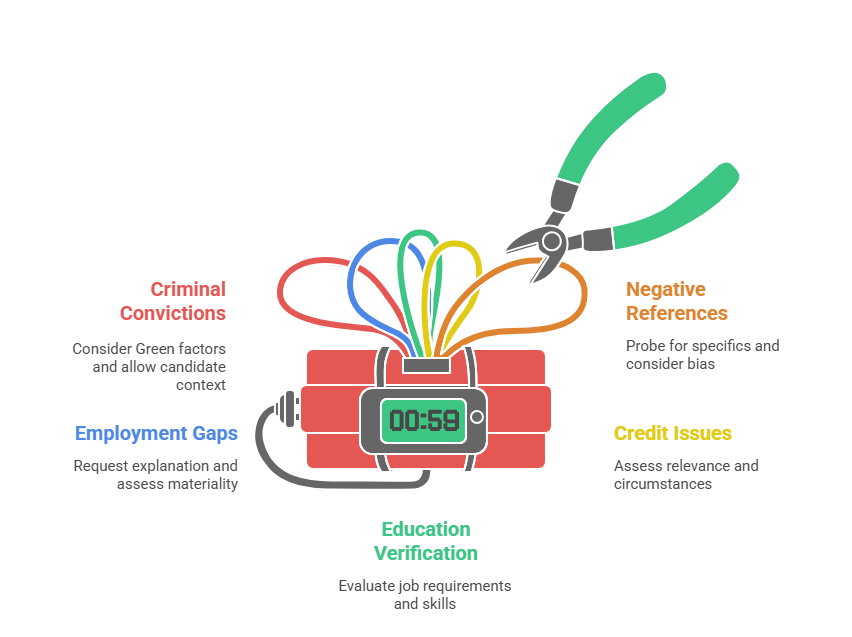Tech startup background checks require specialized screening approaches that balance rapid hiring needs with critical security concerns, intellectual property protection, and regulatory compliance. From security clearance navigation for defense tech companies to comprehensive vetting for roles with access to proprietary algorithms, startups face unique challenges that traditional background screening methods often fail to address adequately.
Key Takeaways
- Tech startup background checks must verify technical credentials, employment history, education, and assess risks related to intellectual property theft and non-compete violations.
- Security clearance hiring for defense and government-focused startups requires understanding DOD classification levels, sponsorship timelines, and interim clearance strategies.
- Intellectual property protection during hiring involves screening for potential conflicts of interest, previous employer agreements, and access to sensitive code repositories.
- Technical role screening extends beyond traditional checks to include GitHub activity verification, open-source contribution analysis, and technical credential validation.
- Compliance requirements for tech startups include FCRA regulations, state-specific privacy laws, and international data protection standards for remote teams.
- Startup-specific screening challenges include budget constraints, speed-to-hire pressures, and balancing thorough vetting with competitive talent acquisition.
Understanding Tech Startup Background Checks
Tech startup background checks differ significantly from traditional corporate screening processes. The technology sector moves rapidly, with companies often needing to fill critical positions within days rather than weeks. However, this urgency cannot compromise security, especially when hiring employees who will access proprietary code, sensitive customer data, or classified information. According to the 2024 Tech Workforce Report, 73% of technology startups experienced at least one security incident related to insider threats or inadequate employee vetting.
Background screening for technology companies must address sector-specific risks that traditional checks often miss. These include verifying claimed technical expertise, confirming the legitimacy of startup experience on resumes, and identifying potential intellectual property conflicts. The screening process also needs to account for the global nature of tech talent, with many startups hiring remote employees across multiple countries with varying legal frameworks.
Tech founders and hiring managers face a critical decision point: how comprehensive should background checks be when every day without a key engineer or developer costs money and competitive advantage? Research from the National Association of Professional Background Screeners indicates that technology companies experience 40% more resume fraud than other industries. This makes thorough verification essential despite time pressures.
Core Components of Tech Startup Screening Programs
Building an effective screening program for a technology startup requires understanding which verification components matter most for different roles. Engineers with access to source code face different risk profiles than sales staff or administrative personnel. A tiered approach allows startups to allocate screening resources efficiently while maintaining security standards.
Criminal background checks remain foundational, but tech companies should focus particularly on fraud, theft, and cybercrime convictions. Employment verification confirms claimed experience at previous technology companies, which is especially important given the prevalence of inflated titles and responsibilities in startup environments. Education verification ensures that claimed computer science degrees, coding bootcamp certifications, and technical credentials are legitimate. Identity verification has gained importance as remote work becomes standard in the technology sector.
| Screening Component | Tech Startup Priority Level | Typical Completion Time |
| Criminal History Check | High | 2-5 business days |
| Employment Verification | Very High | 5-10 business days |
| Education Verification | High | 7-14 business days |
| Professional License Verification | Medium | 3-7 business days |
| Credit History Check | Medium (role-dependent) | 1-3 business days |
| Reference Checks | High | 3-7 days |
The screening timeline directly impacts a startup's ability to secure top talent in competitive markets. Many technology companies lose preferred candidates to competitors during extended background check periods.
Startup Security Clearance Hiring Essentials
Defense technology startups, government contractors, and companies working with classified information face additional complexity through security clearance requirements. Understanding the clearance process, sponsorship obligations, and hiring timelines is essential for startups entering the defense and intelligence sectors. The 2025 defense technology market is projected to exceed $47 billion, with thousands of startups competing for government contracts that require cleared personnel.
Security Clearance Levels and Requirements
The U.S. government issues security clearances at three primary levels, each requiring progressively more extensive background investigations. Confidential clearance, the lowest level, requires a National Agency Check with Law and Credit (NACLC) and typically takes 3-6 months to complete. Secret clearance involves a more thorough investigation and generally takes 6-9 months. Top Secret clearance, required for access to the most sensitive information, demands a Single Scope Background Investigation (SSBI) and typically requires 12-18 months for completion.
Defense tech startups must plan hiring timelines around these extended periods, which creates significant operational challenges. Unlike established defense contractors with existing pools of cleared personnel, startups often need to sponsor employees for their first clearances. Companies cannot bill cleared labor hours to government contracts until clearances are finalized, creating cash flow challenges for early-stage companies. Interim clearances provide partial solutions by allowing employees to begin working on classified projects while full investigations continue.
Sponsorship Process and Employer Obligations
Security clearance sponsorship places specific obligations on employers beyond standard background checks. Companies must be registered in the Defense Counterintelligence and Security Agency (DCSA) database and possess a facility clearance before sponsoring individual employees. The facility clearance process itself requires 6-12 months and involves extensive documentation about company ownership, foreign connections, and security procedures.
Startups must designate a Facility Security Officer (FSO) responsible for managing classified information and coordinating with government security officials. For companies with fewer than 20 employees, the FSO responsibilities often fall to a founder or senior executive, consuming significant time and attention. Financial considerations for startup security clearance hiring include investigation costs, which can range from $3,000 to $15,000 per employee depending on clearance level.
IP Protection in the Hiring Process
Intellectual property protection begins during hiring, not after an employee starts work. Technology startups must screen candidates for potential IP conflicts, existing obligations to previous employers, and risks of inadvertent or intentional trade secret theft. The U.S. Chamber of Commerce estimates that trade secret theft costs American companies between $180 billion and $540 billion annually, with technology companies facing disproportionate risk.
Tech startup background checks should include searches for restrictive covenants, including non-compete agreements, non-solicitation clauses, and confidentiality obligations from previous employment. While non-compete enforceability varies significantly by state, with California notably refusing to enforce them in most circumstances, identifying these agreements prevents future legal disputes. Startups should require candidates to disclose any existing agreements and have legal counsel review them before making offers. Patent and invention assignment agreements from previous employers create ongoing obligations even after employment ends.
Technical and legal due diligence for IP-sensitive hires includes several critical steps:

- Previous Employer Identification: Verify complete employment history with special attention to direct competitors and companies in related technology spaces to assess potential trade secret concerns.
- Publication and Patent Searches: Review academic publications, patent filings, and conference presentations to understand the candidate's prior work and identify potential overlaps with your startup's focus areas.
- GitHub and Open Source Analysis: Examine public code repositories to ensure candidates haven't inappropriately shared proprietary code from previous employers and to verify claimed technical skills.
- Restrictive Covenant Review: Obtain copies of all non-compete, non-solicitation, and confidentiality agreements, with particular attention to temporal and geographic scope.
- Invention Disclosure Review: Request information about pending patents, filed invention disclosures, or other IP developed at previous employers that might create ongoing obligations.
Startups should implement "clean room" hiring practices for especially sensitive roles, ensuring new employees don't bring or reference proprietary information from previous employers. This approach protects both the new employee and the startup from allegations of trade secret misappropriation.
Technical Credential and Skill Verification
Tech startup background checks must extend beyond traditional employment and education verification to confirm claimed technical skills and credentials. Resume fraud in technical roles is particularly problematic because inflated or false capabilities may not become apparent until after significant time and resource investment. A 2024 study by HackerRank found that 68% of technical recruiters encountered candidates whose actual skills didn't match their resumes.
Verifying certifications from AWS, Microsoft Azure, Google Cloud, Cisco, and other technology vendors confirms claimed expertise in specific platforms and tools. These certifications can be validated directly through provider databases, typically within 24-48 hours. However, certification alone doesn't guarantee practical competence, as many technical certifications test theoretical knowledge rather than applied skills. Open source contribution verification provides objective evidence of coding ability and collaborative work style.
| Verification Method | Information Provided | Reliability Level | Time Required |
| Certification Database Checks | Official credential validation | Very High | 1-2 days |
| GitHub Activity Analysis | Code quality and contribution level | High | 2-3 days |
| Technical Reference Checks | Applied skill assessment | Medium-High | 3-5 days |
| Coding Assessments | Real-time skill demonstration | Very High | 1 day |
| Previous Project Verification | Actual work product confirmation | High | 5-7 days |
Technical reference checks differ from standard employment references by focusing on specific competencies, problem-solving approaches, and collaboration capabilities. Asking previous managers or colleagues about concrete technical accomplishments provides more useful information than generic performance questions.
Compliance Requirements for Tech Startup Screening
Technology startups must navigate complex compliance requirements when conducting background checks, starting with the Fair Credit Reporting Act (FCRA). This federal law regulates how employers obtain and use background check information, requiring specific disclosures, written authorization, and adverse action procedures. FCRA violations can result in significant penalties, with some class action settlements reaching millions of dollars. The FCRA requires employers to provide candidates with a clear and conspicuous disclosure that a background check will be conducted, separate from job applications or other documents.
State and local regulations add complexity beyond federal FCRA requirements. Ban-the-box laws in many jurisdictions limit when employers can ask about criminal history and how conviction records can be used in hiring decisions. California's Consumer Privacy Act (CCPA), Virginia's Consumer Data Protection Act (VCDPA), and similar state privacy laws create additional obligations for startups collecting and processing personal information during background screening.
Key compliance considerations for tech startups include:

- FCRA Authorization: Obtain standalone written consent before conducting any background checks, never buried in employment applications or other documents.
- Adverse Action Procedures: Follow required pre-adverse action and final adverse action notice protocols when background check information influences hiring decisions, including providing candidates with copies of reports and dispute information.
- State Ban-the-Box Compliance: Understand which jurisdictions prohibit asking about criminal history before conditional offers and how conviction information can be considered.
- International Hiring Compliance: Navigate GDPR requirements for European candidates, data localization requirements in countries like Russia and China, and varying consent standards across jurisdictions.
- Data Security Requirements: Implement appropriate technical and administrative safeguards to protect sensitive background check information from unauthorized access or breaches.
- Record Retention Policies: Maintain background check records according to federal and state requirements while implementing appropriate disposal procedures for rejected candidates.
International hiring creates additional compliance challenges as tech startups build global remote teams. The European Union's General Data Protection Regulation (GDPR) imposes strict requirements on processing personal data of EU residents, including background check information.
Risk Assessment for Different Tech Roles
Not all positions in a technology startup require identical background screening. Risk-based approaches allow startups to allocate resources effectively while maintaining appropriate security. A data scientist with access to proprietary algorithms faces different risk profiles than a customer support representative, justifying different screening depths.
Engineers and developers with code repository access represent high-risk positions requiring comprehensive screening. This should include thorough employment verification to identify any deviations from claimed experience, education confirmation for technical degrees, IP conflict assessment, and technical skill verification. Criminal background checks should focus particularly on fraud, theft, and cybercrime convictions that indicate potential insider threat risks. Administrative and operations staff typically require moderate screening focused on identity verification, criminal history appropriate to role responsibilities, and employment confirmation.
Executive and leadership positions demand the most extensive screening given their access to strategic information, investor relationships, and company-wide systems. Executive background checks should include comprehensive employment and education verification, litigation and bankruptcy searches, media and reputation analysis, professional reference checks with former board members or investors, and financial disclosure review where appropriate. Startups should document the risk assessment rationale for different position categories, creating defensible screening policies that demonstrate business necessity.
Balancing Speed and Thoroughness in Startup Hiring
Technology startups face constant tension between conducting thorough background checks and maintaining competitive hiring timelines. In tight talent markets, delays of even a few days can result in losing candidates to companies with faster processes. However, cutting corners on background screening can expose startups to security incidents, IP theft, or compliance violations that threaten company survival.
Progressive screening approaches offer one solution by conducting basic checks before the offer and completing more extensive verification after start date. Initial screening might include identity verification, basic criminal history, and critical employment confirmation, with education verification and comprehensive reference checks continuing during onboarding. This approach reduces time-to-start while maintaining appropriate diligence. Conditional offers based on satisfactory background check completion protect startups legally while allowing faster candidate communication.
Technology solutions accelerate background screening through automated verification systems, API integrations with educational institutions and certification databases, and instant database searches for certain record types. Modern background check platforms can complete many verification components within 48-72 hours compared to traditional 1-2 week timelines. However, some components like international education verification or comprehensive employment checks still require extended periods.
Vendor Selection for Tech Startup Background Checks
Choosing the right background screening vendor significantly impacts both the quality of information received and the candidate experience. Technology startups should evaluate vendors on turnaround time, accuracy rates, compliance expertise, technical integration capabilities, pricing models, and customer support quality. Consumer Reporting Agencies (CRAs) that conduct background checks must maintain FCRA compliance, proper data security, and dispute resolution procedures.
Integration capabilities matter for startups using applicant tracking systems or HR platforms. API connections between screening vendors and existing systems reduce manual data entry, accelerate workflows, and improve recordkeeping. Some background check platforms offer embedded solutions that allow candidates to initiate and complete screening without leaving the company's hiring portal. Negotiating contract terms deserves careful attention, particularly regarding turnaround time commitments, accuracy guarantees, data security provisions, and pricing locks as company volume increases.
Building Internal Background Check Policies
Formal background check policies provide consistency, demonstrate compliance, and protect startups from discrimination claims. Written policies should specify which positions require screening, what screening components apply to each role category, decision-making criteria based on findings, and adverse action procedures. Policy documentation proves that hiring decisions follow consistent business-related criteria rather than arbitrary or discriminatory factors.
Individualized assessment requirements under Equal Employment Opportunity Commission (EEOC) guidance mean startups cannot automatically disqualify candidates based on criminal records. Policies should outline how criminal findings are evaluated considering offense nature, time elapsed, and relationship to job responsibilities. This assessment should be documented for each case where criminal history influences hiring decisions. Regular policy review ensures alignment with changing regulations and business needs.
Training hiring managers on background check policies and procedures prevents inconsistent application and potential discrimination. Managers should understand what information they can and cannot consider, proper adverse action procedures, and when to consult legal counsel or HR specialists. Documentation of training completion provides evidence of good-faith compliance efforts.
Post-Hire Monitoring and Continuous Screening

Background screening doesn't end when an employee starts work. Continuous monitoring programs alert employers to new criminal charges, sanctions list additions, or professional license revocations that might impact job fitness. For technology startups handling sensitive data or operating in regulated industries, post-hire monitoring provides ongoing risk management.
Continuous criminal monitoring tracks new arrests or convictions for current employees in positions where such information remains relevant. This screening approach is particularly valuable for financial services fintechs, healthcare technology companies, and other startups in regulated sectors. However, continuous monitoring raises additional compliance considerations, requiring ongoing FCRA authorization and careful limitation to business-necessary positions. Re-screening policies for promotions or role changes ensure appropriate verification when responsibilities expand significantly.
| Continuous Monitoring Type | Appropriate Use Cases | Update Frequency | Cost Considerations |
| Criminal Record Monitoring | Financial access, sensitive data handling, security clearance positions | Real-time to monthly | $2-10 per employee monthly |
| Professional License Verification | Healthcare tech, financial services, regulated industries | Monthly to quarterly | $3-8 per employee monthly |
| Sanctions List Screening | International business, financial services, defense tech | Weekly to daily | $5-15 per employee monthly |
| Sex Offender Registry Monitoring | Child-focused products, educational technology | Monthly | $1-3 per employee monthly |
Privacy considerations for continuous monitoring require careful attention. Employees should receive clear notice that ongoing screening will occur and understand what information will be monitored.
Addressing Problematic Background Check Findings
How startups respond to negative background check information significantly impacts both legal compliance and talent acquisition effectiveness. Not all negative findings warrant disqualification, and premature rejections may eliminate qualified candidates or violate anti-discrimination laws. EEOC guidance emphasizes individualized assessment rather than blanket exclusions based on criminal history or other potentially sensitive information.
Criminal record evaluation should consider offense nature, time elapsed since conviction, evidence of rehabilitation, and relationship to job responsibilities. A ten-year-old misdemeanor conviction for marijuana possession has minimal relevance for most tech positions, while recent fraud convictions deserve serious consideration for roles involving financial access. Documentation of the assessment rationale provides protection if hiring decisions are challenged. Employment verification discrepancies require investigation before reaching conclusions.
Response frameworks for common negative findings include:

- Criminal Convictions: Consider Green factors (nature of offense, time elapsed, job nature), document individualized assessment, and allow candidates to provide context or evidence of rehabilitation.
- Employment Gaps or Discrepancies: Request candidate explanation, assess whether differences are material to job fitness, and evaluate pattern of discrepancies versus isolated incidents.
- Failed Education Verification: Determine whether claimed credentials were job requirements or preferred qualifications, assess candidate's actual skills through technical evaluation, and consider whether misrepresentation was intentional.
- Credit Issues: Evaluate relevance to position responsibilities, consider whether financial problems resulted from circumstances beyond candidate control, and assess recency and trajectory of credit issues.
- Negative References: Probe for specific behavioral examples rather than general criticisms, consider reference source credibility and potential bias, and seek balanced perspective from multiple references.
Legal counsel consultation is advisable when background checks reveal significant issues that might lead to rejection of candidates from protected classes.
Cost Management for Startup Background Screening Programs
Background check costs represent significant expenses for startups operating on limited budgets. Basic screening packages typically range from $30-75 per candidate, while comprehensive checks for senior positions can exceed $200-500. For a startup hiring 20 employees in its first year, background screening might consume $1,500-10,000 depending on comprehensiveness.
Tiered screening approaches reduce costs by matching verification depth to role risk profiles. Entry-level positions might require only identity verification, criminal history, and employment confirmation for the most recent position. Senior technical roles warrant comprehensive employment verification covering 7-10 years, education confirmation, technical credential validation, and thorough reference checks. Executive positions justify the most extensive screening including media searches and financial disclosure review.
Volume commitments with screening vendors often yield substantial discounts. Startups anticipating significant hiring can negotiate lower per-check fees in exchange for minimum monthly volume guarantees. Some vendors offer startup programs with discounted initial pricing that scales as hiring increases. However, volume commitments create obligations even during slower hiring periods, so projections should be conservative.
International Hiring and Global Background Checks
Technology startups increasingly hire remote employees internationally, creating complex background screening challenges. Verification processes, data availability, legal frameworks, and timelines vary dramatically across countries. A criminal background check that takes three days in the United States might require six weeks in India and be legally unavailable in some European countries.
International background checks must comply with data protection laws in the candidate's country, which are often more restrictive than U.S. regulations. GDPR requirements for European candidates include establishing lawful bases for processing, implementing data protection impact assessments, and providing specific privacy disclosures. Some countries restrict employer access to criminal records or limit how conviction information can be used in employment decisions. Verification methods differ internationally, with some countries lacking centralized criminal databases or standardized education verification processes.
International screening considerations by region:
- European Union: Navigate GDPR requirements, understand limited criminal record access in many countries, expect 4-8 week timelines for comprehensive checks, and utilize in-country verification partners for education and employment confirmation.
- Latin America: Plan for extended verification timelines of 3-6 weeks, understand that criminal records may only be available at national rather than regional levels, and expect challenges with employment verification from smaller companies.
- Asia-Pacific: Recognize vast differences in data availability and legal frameworks across countries, expect particularly long timelines in China and India for comprehensive checks, and understand that some countries restrict foreign employer access to certain records.
- Middle East/Africa: Anticipate extremely limited background check options in many countries, rely heavily on reference checks and document verification, and understand that in-country presence or partners may be essential.
Cost implications for international background checks can be substantial, with comprehensive international screenings ranging from $100-400 per candidate depending on country and scope.
Emerging Trends in Tech Startup Background Screening
Background screening continues evolving with new technologies, regulatory developments, and changing workforce dynamics. Artificial intelligence and machine learning increasingly automate portions of the verification process, accelerating turnaround times and improving accuracy. AI systems can flag inconsistencies in employment history, identify potential resume fraud patterns, and predict which candidates warrant additional scrutiny.
Blockchain verification systems promise to revolutionize credential and employment verification by creating tamper-proof records of education, certifications, and work history. Several pilot programs allow job seekers to maintain verified credential portfolios that employers can access instantly with permission. Widespread adoption could dramatically reduce verification timelines and costs while improving accuracy. Remote hiring verification addresses challenges created by distributed workforces, with identity verification increasingly relying on biometric matching, video verification, and digital document authentication.
Conclusion
Tech startup background checks require specialized approaches that address sector-specific risks while maintaining the hiring speed necessary for competitive talent acquisition. From security clearance navigation for defense tech companies to intellectual property protection across all startup categories, founders and hiring managers must implement screening programs appropriate to their specific risk profiles. Balancing thoroughness with efficiency, managing costs on startup budgets, and maintaining compliance with complex regulations creates ongoing challenges that demand thoughtful policies and vendor partnerships. As technology companies continue driving economic growth and innovation, investing in proper background screening protects both individual startups and the broader ecosystem from insider threats, IP theft, and compliance failures.
Frequently Asked Questions
How much do tech startup background checks typically cost?
Basic background checks for tech startups cost between $30-75 per candidate and include criminal history, identity verification, and recent employment confirmation. Comprehensive screening for senior technical roles ranges from $150-300 and adds education verification, extended employment history, and technical credential validation. Startups should budget approximately $50-100 per hire for mid-level positions with appropriate risk-based screening.
How long do background checks take for startup hiring?
Standard tech startup background checks typically complete within 3-7 business days for domestic candidates with straightforward histories. International candidates or complex employment histories may require 2-4 weeks for thorough verification. Security clearance processes extend timelines dramatically, with Secret clearances taking 6-9 months and Top Secret clearances requiring 12-18 months for completion.
Are background checks legally required for tech startups?
Background checks are not legally required for most tech startup positions, but specific circumstances create obligations. Companies working with government contracts often face contractual requirements for employee screening. Startups in regulated industries like financial technology may need to conduct checks mandated by oversight agencies.
What should tech startups look for in background checks for engineers?
Engineer background checks should verify employment history at previous technology companies, confirm computer science or related technical degrees, and validate claimed technical certifications from vendors like AWS or Microsoft. Criminal history checks should focus on fraud, theft, and cybercrime convictions relevant to code access and data handling.
How do startups handle failed background checks?
Startups must follow FCRA adverse action procedures when background check findings influence hiring decisions, including providing pre-adverse action notice with a copy of the report and final adverse action notice if decision stands. EEOC guidance requires individualized assessment of criminal findings rather than automatic disqualification, considering offense nature, time elapsed, and job relevance.
Can startups conduct background checks on international remote employees?
Tech startups can conduct background checks on international employees but must navigate varying legal frameworks, data protection requirements, and verification methods across countries. GDPR requirements apply to European candidates and restrict certain screening activities. International verification typically requires longer timelines of 3-8 weeks and costs $100-400 per candidate.
What is the difference between security clearance levels for defense tech startups?
Confidential clearance involves basic investigation taking 3-6 months and grants access to information that could cause damage to national security if disclosed. Secret clearance requires more extensive investigation taking 6-9 months and covers information that could cause serious damage if disclosed. Top Secret clearance involves the most thorough investigation requiring 12-18 months, granting access to information that could cause exceptionally grave damage if disclosed.
Do background checks verify coding skills or technical abilities?
Traditional background checks verify credentials and history but don't directly assess technical competencies. Startups should supplement background screening with technical credential verification confirming platform certifications, GitHub activity analysis examining code quality, and coding assessments demonstrating real-time skills.
Additional Resources
- Professional Background Screening Association (PBSA) Accreditation Standards
https://www.psbassociation.org/accreditation - FCRA Compliance Guide for Employers - Federal Trade Commission
https://www.ftc.gov/business-guidance/resources/using-consumer-reports-what-employers-need-know - Defense Counterintelligence and Security Agency (DCSA) Security Clearance Process
https://www.dcsa.mil/is/personnel-security/ - EEOC Guidance on Criminal Records in Employment Decisions
https://www.eeoc.gov/laws/guidance/arrest-and-conviction-records - Society for Human Resource Management (SHRM) Background Check Templates
https://www.shrm.org/resourcesandtools/tools-and-samples/policies/pages/cms_021474.aspx - International Background Screening Guide - Global Compliance
https://www.linkedin.com/business/talent/blog/talent-acquisition/countries-guide-to-background-checks - National Association of Professional Background Screeners Best Practices
https://napbs.com/resources/best-practices - Technical Recruiting: GitHub and Stack Overflow Verification Methods
https://stackoverflow.blog/2023/09/20/hiring-developers-github-stackoverflow-verification/

GCheck Editorial Team
Meet the GCheck Editorial Team, your trusted source for insightful and up-to-date information in the world of employment background checks. Committed to delivering the latest trends, best practices, and industry insights, our team is dedicated to keeping you informed.
With a passion for ensuring accuracy, compliance, and efficiency in background screening, we are your go-to experts in the field. Stay tuned for our comprehensive articles, guides, and analysis, designed to empower businesses and individuals with the knowledge they need to make informed decisions.
At GCheck, we're here to guide you through the complexities of background checks, every step of the way.





